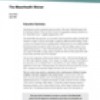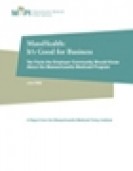Life on the Edge of the Health Care System: The Growing Problem of the Uninsured in Massachusetts

A description of who the uninsured are in Massachusetts and how they are impacted by a lack of insurance.

A description of who the uninsured are in Massachusetts and how they are impacted by a lack of insurance.

Highlights of the states experience in health reform with descriptions of the challenges ahead in passing comprehensive health reform legislation.

Report on 2003 public opinion survey finds that most people in the Commonwealth strongly believe that everyone in the state should be able to get the health care they need and are supportive of a number of proposals to ensure this. However, the survey also finds numerous challenges to significant action at the state level and points to the need for strong leadership on this issue.

An examination of the issue of medical debt among Massachusetts residents. This report was written before the passage and implementation of the 2006 health reform law.

Non-elderly people with disabilities comprise one-fifth of MassHealth enrollment and an even larger share of expenditures, yet their circumstances and the crucial role of Medicaid in financing essential services for them are not well understood. This comprehensive report seeks to promote such understanding and support informed policy discussions about this group.

The Medicare Prescription Drug Improvement and Modernization Act of 2003 created a new drug benefit for Medicare recipients, which began in 2006. The new law had significant effects on the Massachusetts Medicaid program, which at the time provided prescription drug and other benefits to about 190,000 Medicare beneficiaries. This policy brief identifies the key factors affecting the interaction between Medicare and Medicaid and describes the impacts "financial, programmatic and administrative" of the new drug benefit on the Medicaid program in Massachusetts.

An examination of the costs of providing care for uninsured Massachusetts residents.

As many as 106,000 of the State's 460,000 uninsured residents could be eligible for MassHealth coverage. The Massachusetts Medicaid Policy Institute's new issue brief "Eligible but Uninsured: Challenges to Getting and Keeping MassHealth" describes current initiatives to enroll the eligible uninsured and examines some of the barriers Massachusetts residents face to getting and retaining MassHealth benefits.

An examination of how to pay for near-univeral health insurance in Massachusetts and the policy options available.

This chartbook is a tool to broaden our understanding of the more than half a million people who lack health coverage in Massachusetts, and support the development of policies to help them.

In 2005, Massachusetts renegotiated with the federal government major provisions of the State’s Medicaid program governed by the MassHealth Waiver, which has been in effect since 1997. The new terms of the Waiver, which became effective July 1, 2005, are significantly different from the current terms, particularly in the details of how the program is financed. This issue brief describes the most significant changes in the Waiver agreement and identifies the major issues involved with state implementation.

This report provides new perspectives about the importance of MassHealth for the state's business community and, in particular, explains how a strong MassHealth program benefits employers. MassHealth is a major source of health insurance for low-wage workers, covering more than 400,000 employed people and their families. It is a major reason why Massachusetts has a relatively low percentage of people without insurance, and program expansions have helped reduce the costs of uncompensated care, which is financed in part by the business community. Adequate funding for MassHealth also helps minimize provider cost-shifting to employers.